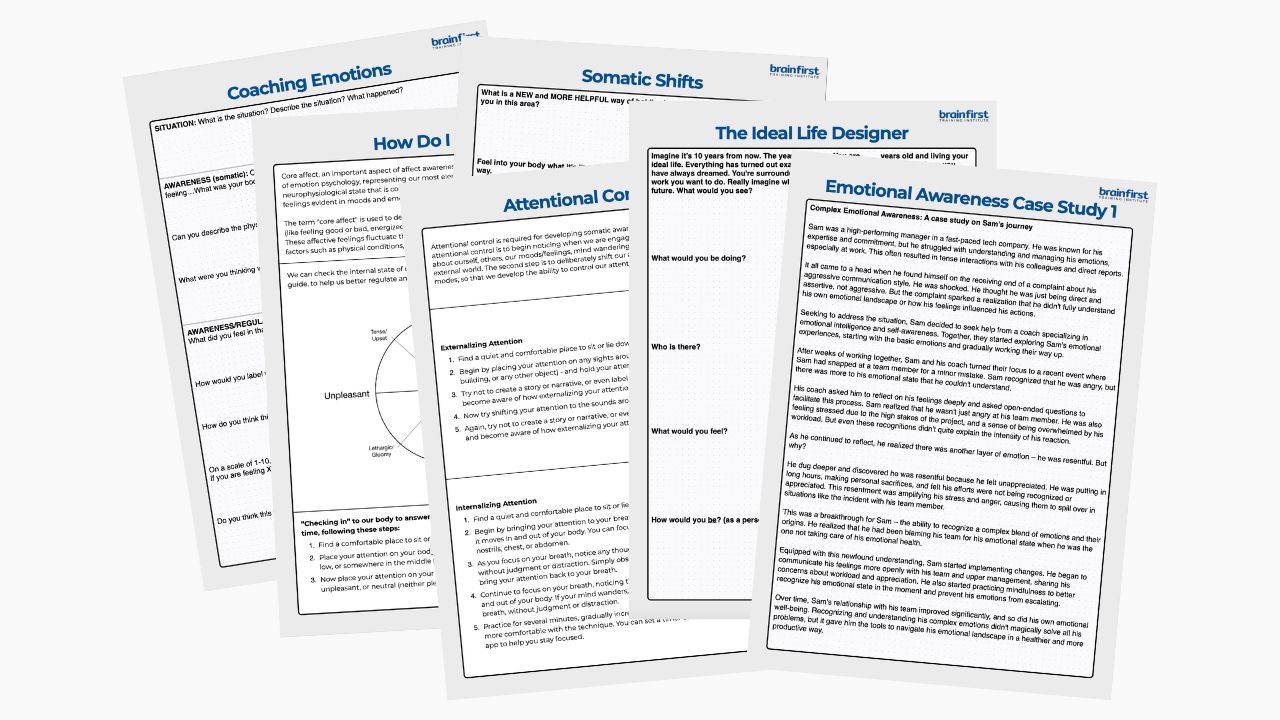BrainFirst Workshops & Masterclasses
Neuroscience-Based Education and Training for Coaches, Organizational Consultants, Leaders and Managers.
NOTIFY ME OF UPCOMING TRAININGUpcoming Workshops

Feelings of uncertainty or lack of control over our circumstances. Worrying about the future. Feeling like we can't handle problems as well as we used to. Having strong emotional reactions. They all have very real physiological responses, which can lead to chronic stress. So it's clear that we need a way to change our response to situations that cause us stress.
LEARN MOREIntentional Change




Coaching The Ideal Self
The self is not a singular, stable entity. It’s something we build and rebuild over time, shaped by the same “ingredients” or psychological primitives that our brain uses to construct emotion, cognition, and other mental states.
In other words, the Ideal Self is not discovered—it’s constructed! Learn the tools to construct an ideal self that aligns with vision, values, and aspirations—so you can help clients create the life they truly want.
Vision, Values, And Emotional Attractors
At the conclusion of this training, you will be able to:
- Explain the importance of personal vision, including purpose/meaning, core values, and aspirational identities.
- Describe the roles that emotional attractors and the Ideal Self play in helping people change.
- Use a neuroscience-based approach when working with values and vision, as well as co-creating the relationship.
- Coach with curiosity and facilitate change by working with components of the Self: vision, values and aspirational identities.
Behavior Change Blueprint
Upon completion of this training you will be able to:
- Use evidence-based behavior change strategies to help clients define their ideal future and recognize their obstacles to success
- Identify when to shift from visioning and future-oriented questioning to problem solving and planning (timing this correctly accelerates results)
- Help clients gain insight into the barriers preventing them from changing their behavior
- Create an action plan so that clients know exactly what to work on, and can start taking action immediately (an invaluable but often overlooked step in behavior change)
Habit Formation & Motivation Method
We have all heard of the power of habit. Yet, so many clients struggle to make behavior change stick. Upon completion of this training you will be able to:
- Understand the neuroscience of how habits are formed, so you can help clients to start taking charge of the habits that impact their life.
- Identify the specific behaviors and habits that need to change to unlock potential.
- Leverage the brain's valuation system to "tip" into a new behavior and reinforce it for long-term change.
- Know when to use motivation, immediate action, or micro celebration to establish and reinforce new behaviors.
- Draw from the neuroscience-based habit formation map, so you know exactly what part of the habit process to focus on for rapid and lasting change.
Mindset & Self-Regulation




Resilience & Strengths Builder
Resilience refers to the process of adapting well in the face of adversity, trauma, tragedy, threats, or significant sources of stress. Upon completion of this training you will be able to:
- Highlight that resilience it's a dynamic process that can change over time and be developed or strengthened
- Describe the neuroscience of resilience and other factors that impact it: physical, social, emotional, environmental etc
- Recommend tools and resources to help clients take a multifaceted approach to developing resilience
- Draw on a range of tools to help coach the various drivers of resilience
- Help clients identify and develop character strengths, as a way of being, to cultivate resilience
Growth Mindset Method
Mindsets are not just theoretical constructs. They have profound real-world implications. From educational settings to professional environments, the mindset we adopt can shape learning experiences, responses to setbacks, and overall trajectories of success. Upon completion of this training you will be able to:
- Explain how mindsets shape the way we perceive our abilities, how we approach challenges, and how we react to successes and failures.
- Identify mindset characteristics and help clients shift from a fixed to a growth mindset by changing their language.
- Use the Mindset Characteristics Scale to help clients identify the mindset subfactors that need attention, so you can coach them effectively.
- Teach clients how to adopt a growth mindset, develop a mindset implementation plan, and help them shift unhelpful fixed mindset beliefs.
- Develop an understanding of the multidimensional approach to the growth mindset, to help clients develop the growth mindset sub-abilities.
The Stress Mastery Method
Stress arises when we perceive a situation as demanding more than the resources we believe we have to handle it.
This is known as the cognitive appraisal theory of stress, which emphasizes that our brain’s interpretation of the situation and our available internal resources—rather than the situation itself—determines our stress response.
In this workshop you will learn:
- The basic science of stress and the factors that contribute to feeling stressed.
- How to identify the unique "ingredients" the brain uses to construct stress responses.
- How to shift unhelpful thoughts that cause stress, overwhelm, uncertainty or doubt.
- Simple techniques to change how your brain responds to stressful or worrying situations.
Procrastination Eliminator
Upon completion of this training you will be able to:
- Describe temporal motivation theory and how it underpins procrastination
- Identify and address the contributing factors that cause the client to postpone, delay, or put off tasks and decisions
- Help clients work with the brain's valuation system so they can start taking immediate action
Brain Health & Performance




Mastering Sleep
Good sleep is essential to health and performance, and the quality of our sleep impacts every area of our life. Upon completion of this training you will be able to:
- Explain the sleep cycle, circadian rhythm, and the importance of sleep quality and how it impacts health and performance
- Assess sleep quality with easy-to-use science-based assessments
- Apply the neurophysiologically-based model of sleep hygiene to tailor sleep recommendations for clients
- Utilize various strategies and tools to help clients achieve high quality sleep, so they can perform at their best
Eating For Brain Health And Performance
Nutrition plays a critical role in brain health and performance. Upon completion of this training you will be able to:
- Explain how food choices can drain or boost our energy, and impact brain health and performance
- Describe the main sources of brain draining foods, drinks and approaches to cooking that are detrimental to health and performance
- Help clients make better food choices to support their high-performance way of being
- Use a circadian-approach to food to improve body composition, glucose levels and other markers of metabolic health
Breathing For Brain Health And Performance
Breathing impacts every aspect of health and performance, yet, we often don't give it a second thought. Upon completion of this training you will be able to:
- Explain functional breathing and breath-work science to clients, and why taking control of their breath is one of the fastest way to influence physiology and brain performance
- Use breathing techniques to reduce stress and relax the nervous system, and where "deep breathing" goes wrong
- Help clients develop new breathing habits that support attention, focus and the high-performance way of being
Moving For Brain Health And Performance
Movement is so much more than exercise, particularly where the brain is concerned. Upon completion of this training you will be able to:
- Describe the relationship between movement, movement types, and brain health and performance
- Create a physical activity plan designed with client preferences, goals and circumstances in mind
- Explain how different types of movement impact different mental functions
- Help clients adopt movement habits that increase attention span, improve mood, reduce anxiety, and prime our brain for focused productivity
Performance & Productivity




Cognitive Performance Plan
Studies have revealed that there are at least three independent intellectual domains, that each domain has its own brain network, and that they are highly susceptible to a number of influences. Upon completion of this training you will be able to:
- Describe the four domains of cognitive function and their roles in daily life and high-performance
- Explain how sleep, exercise, nutrition and stress impact cognitive function, and how clients can make simple changes to improve their cognition overnight
- Recommend tools, resources and products to help clients improve memory, reasoning, verbal ability and attention
Peak Performance Protocol
A 'mental state' is defined as a state of being that makes us feel or think a certain way. Peak Performance Mental States include flow, thinking, learning, creativity, and relaxation states. Upon completion of this training you will be able to:
- Understand the neuroscience evidence supporting peak performance mental states
- Explain that focused attention is key to accessing states needed for performance and productivity
- Describe the various triggers that dramatically increase the likelihood for peak performance mental states to emerge
- Provide tools to help clients to switch on their Peak Performance Mode, and stay in the optimal arousal zone
Problem Solving Protocol
Problem-solving and decision-making can be tackled strategically. Upon completion of this training you will be able to
- Describe the how, why and when of insight and analytical thinking as thought-modalities for problem solving
- Highlight why the biggest issue when faced with a problem or decision is not the problem or decision itself, but the brain's response, and how to address it
- Utilize a neuroscience-based coaching process to facilitate insight-solutions to problems
- Help clients mitigate biases to make more effective decisions
Productivity Optimizer
Fewer distractions, less demands, lower stress, high quality work, faster progress towards goals, more free time. Productivity is key! Upon completion of this training you will be able to:
- Describe the roles of reward (dopamine), arousal (noradrenaline), and attention (acetylcholine) for developing motivation and sustained focus for important tasks
- Help clients use deliberate distraction to improve productivity and flow (not all distraction is bad)
- Recommend tools and resources to help clients build their productivity skills
- Develop a productivity checklist with clients so that they can reach an optimal state of functioning for productivity
Intentional Change

Vision, Values, And Emotional Attractors
At the conclusion of this training, you will be able to:
- Explain the importance of personal vision, including purpose/meaning, core values, and aspirational identities.
- Describe the roles that emotional attractors and the Ideal Self play in helping people change.
- Use a neuroscience-based approach when working with values and vision, as well as co-creating the relationship.
- Coach with curiosity and facilitate change by working with components of the Self: vision, values and aspirational identities.

Behavior Change Blueprint
Upon completion of this training you will be able to:
- Use evidence-based behavior change strategies to help clients define their ideal future and recognize their obstacles to success
- Identify when to shift from visioning and future-oriented questioning to problem solving and planning (timing this correctly accelerates results)
- Help clients gain insight into the barriers preventing them from changing their behavior
- Create an action plan so that clients know exactly what to work on, and can start taking action immediately (an invaluable but often overlooked step in behavior change)

Habit Breakthrough Blueprint
We have all heard of the power of habit. Yet, so many clients struggle to make behavior change stick. Upon completion of this training you will be able to:
- Explain how habits are formed and why they impact every area of our life
- Help clients identify the behaviors and habits that need to change in order to shift from high potential into high-performance
- Draw on what is known about the brain's valuation system to help clients reinforce their changed behavior
- Teach clients the smallest next step (SNS) hack, as well as many others, so that they can change their own behavior in the moment when it is needed most
- Describe the behavior design model and why it is the key to making habit formation easy
Mindset & Self-Regulation

Resilience & Strengths Builder
Resilience refers to the process of adapting well in the face of adversity, trauma, tragedy, threats, or significant sources of stress. Upon completion of this training you will be able to:
- Highlight that resilience it's a dynamic process that can change over time and be developed or strengthened
- Describe the neuroscience of resilience and other factors that impact it: physical, social, emotional, environmental etc
- Recommend tools and resources to help clients take a multifaceted approach to developing resilience
- Draw on a range of tools to help coach the various drivers of resilience
- Help clients identify and develop character strengths, as a way of being, to cultivate resilience

Growth Mindset Method
Mindsets are not just theoretical constructs. They have profound real-world implications. From educational settings to professional environments, the mindset we adopt can shape learning experiences, responses to setbacks, and overall trajectories of success. Upon completion of this training you will be able to:
- Explain how mindsets shape the way we perceive our abilities, how we approach challenges, and how we react to successes and failures.
- Identify mindset characteristics and help clients shift from a fixed to a growth mindset by changing their language.
- Use the Mindset Characteristics Scale to help clients identify the mindset subfactors that need attention, so you can coach them effectively.
- Teach clients how to adopt a growth mindset, develop a mindset implementation plan, and help them shift unhelpful fixed mindset beliefs.
- Develop an understanding of the multidimensional approach to the growth mindset, to help clients develop the growth mindset sub-abilities.

The Stress Mastery Method
Stress arises when we perceive a situation as demanding more than the resources we believe we have to handle it.
This is known as the cognitive appraisal theory of stress, which emphasizes that our brain’s interpretation of the situation and our available internal resources—rather than the situation itself—determines our stress response.
In this workshop you will learn:
- The basic science of stress and the factors that contribute to feeling stressed.
- How to identify the unique "ingredients" the brain uses to construct stress responses.
- How to shift unhelpful thoughts that cause stress, overwhelm, uncertainty or doubt.
- Simple techniques to change how your brain responds to stressful or worrying situations.

Procrastination Eliminator
Upon completion of this training you will be able to:
- Describe temporal motivation theory and how it underpins procrastination
- Identify and address the contributing factors that cause the client to postpone, delay, or put off tasks and decisions
- Help clients work with the brain's valuation system so they can start taking immediate action
Brain Health & Performance

Mastering Sleep
Good sleep is essential to health and performance, and the quality of our sleep impacts every area of our life. Upon completion of this training you will be able to:
- Explain the sleep cycle, circadian rhythm, and the importance of sleep quality and how it impacts health and performance
- Assess sleep quality with easy-to-use science-based assessments
- Apply the neurophysiologically-based model of sleep hygiene to tailor sleep recommendations for clients
- Utilize various strategies and tools to help clients achieve high quality sleep, so they can perform at their best

Eating For Brain Health And Performance
Nutrition plays a critical role in brain health and performance. Upon completion of this training you will be able to:
- Explain how food choices can drain or boost our energy, and impact brain health and performance
- Describe the main sources of brain draining foods, drinks and approaches to cooking that are detrimental to health and performance
- Help clients make better food choices to support their high-performance way of being
- Use a circadian-approach to food to improve body composition, glucose levels and other markers of metabolic health

Breathing For Brain Health And Performance
Breathing impacts every aspect of health and performance, yet, we often don't give it a second thought. Upon completion of this training you will be able to:
- Explain functional breathing and breath-work science to clients, and why taking control of their breath is one of the fastest way to influence physiology and brain performance
- Use breathing techniques to reduce stress and relax the nervous system, and where "deep breathing" goes wrong
- Help clients develop new breathing habits that support attention, focus and the high-performance way of being

Moving For Brain Health And Performance
Movement is so much more than exercise, particularly where the brain is concerned. Upon completion of this training you will be able to:
- Describe the relationship between movement, movement types, and brain health and performance
- Create a physical activity plan designed with client preferences, goals and circumstances in mind
- Explain how different types of movement impact different mental functions
- Help clients adopt movement habits that increase attention span, improve mood, reduce anxiety, and prime our brain for focused productivity
Performance & Productivity

Cognitive Performance Plan
Studies have revealed that there are at least three independent intellectual domains, that each domain has its own brain network, and that they are highly susceptible to a number of influences. Upon completion of this training you will be able to:
- Describe the four domains of cognitive function and their roles in daily life and high-performance
- Explain how sleep, exercise, nutrition and stress impact cognitive function, and how clients can make simple changes to improve their cognition overnight
- Recommend tools, resources and products to help clients improve memory, reasoning, verbal ability and attention

Peak Performance Protocol
A 'mental state' is defined as a state of being that makes us feel or think a certain way. Peak Performance Mental States include flow, thinking, learning, creativity, and relaxation states. Upon completion of this training you will be able to:
- Understand the neuroscience evidence supporting peak performance mental states
- Explain that focused attention is key to accessing states needed for performance and productivity
- Describe the various triggers that dramatically increase the likelihood for peak performance mental states to emerge
- Provide tools to help clients to switch on their Peak Performance Mode, and stay in the optimal arousal zone

Problem Solving Protocol
Problem-solving and decision-making can be tackled strategically. Upon completion of this training you will be able to
- Describe the how, why and when of insight and analytical thinking as thought-modalities for problem solving
- Highlight why the biggest issue when faced with a problem or decision is not the problem or decision itself, but the brain's response, and how to address it
- Utilize a neuroscience-based coaching process to facilitate insight-solutions to problems
- Help clients mitigate biases to make more effective decisions

Productivity Optimizer
Fewer distractions, less demands, lower stress, high quality work, faster progress towards goals, more free time. Productivity is key! Upon completion of this training you will be able to:
- Describe the roles of reward (dopamine), arousal (noradrenaline), and attention (acetylcholine) for developing motivation and sustained focus for important tasks
- Help clients use deliberate distraction to improve productivity and flow (not all distraction is bad)
- Recommend tools and resources to help clients build their productivity skills
- Develop a productivity checklist with clients so that they can reach an optimal state of functioning for productivity
Your Learning Experience
Online education and training, toolkits, and support community.
Continuing Professional Development
Your education and training are delivered via online workshops and implementation sessions. Self-coaching exercises, videos, cheat-sheets, prompts, and other follow-along learning resources are also included.


Workshops & Guided Peer Coaching Sessions
The training workshops provide an interactive learning experience, and the guided peer coaching sessions (for coach-specific education workshops) provide an opportunity to put your new knowledge into practice with fellow coaches.
Support Community
Stay connected to your peers in our private online group. Discuss the training, ask questions, organize peer coaching sessions, and stay up-to-date.


Toolkits
Every workshop or masterclass includes a Toolkit. For coach-specific education, the toolkit includes resources to help you assess, advise and facilitate client change. Tools include client assessments, training guides, cheatsheets, and client info handouts.
Your Facilitator

Ramon David, MSc
Ramon David is the founder of BrainFirst® Institute, delivering applied neuroscience training for coaches since 2016. Ramon holds a Masters degree in Applied Neuroscience and has conducted neuroscience-based research with real-world application. He has 12,000+ hours of coaching, training and mentoring experience, and has trained thousands of coaches. He is currently completing his PhD research, investigating a neuroscience-based approach to psychological needs, and is the author of the Handbook of Professional Coaching Competencies, with neuroscience and psychology insights.
BrainFirst Continuing Education
Neuroscience-Based Education and Training for Coaches, Organizational Consultants, Leaders and Managers.
- Live Training Workshops to upgrade your knowledge.
- Implementation Sessions to hone your professional skills.
- Toolkit to self-coach, or assess, advise, and coach clients (coach-specific education).
- Support Community to stay connected and ahead of the curve.
